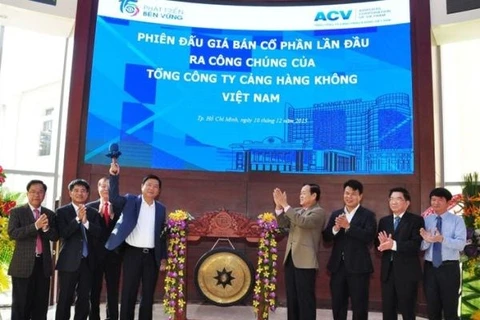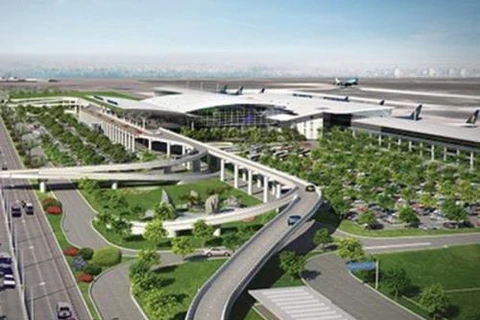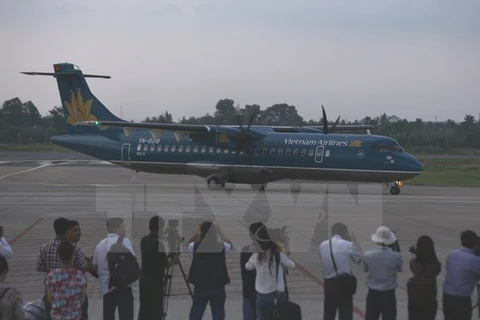 A corner of Terminal T2 at Noi Bai International Airport, which is under management of the Airports Corporation of Vietnam. (Photo: VNA)
A corner of Terminal T2 at Noi Bai International Airport, which is under management of the Airports Corporation of Vietnam. (Photo: VNA) Hanoi (VNA) – Domestic and foreign companies are vying to invest in the Airports Corporation of Vietnam (ACV), a State-owned company of the Ministry of Transport managing 25 airports across Vietnam.
Imex Pan Pacific Co Ltd (IPP) recently expressed its hope to be a strategic investor of the ACV with a volume of 5 percent of the corporation's registered capital.
In a document sent to the transport ministry, Le Hong Thuy Tien, president of the IPP and wife of Johnathan Hanh Nguyen – a renowned Vietnamese businessman in Vietnam and the Philippines, said if her company was selected to be the ACV's strategic investor, IPP would support it on business administration, market development and not transfer its shares in ten years.
IPP, an official sole supplier of 60 famous brand names of the world in Vietnam, has met success with non-airlines services at Manila airport in the Philippines, Noi Bai, Tan Son Nhat, Cam Ranh and Phu Quoc airports.
IPP is one of many domestic and foreign investors expected to own such a hot share of ACV, which requires a financial institution to have an ownership capital of no less than 5 billion USD on December 31, 2014; it does not witness a cumulative loss, and it has earned a profit of at least 5 percent of its revenue the previous year.
To get a chance, Bank for Investment and Development (BIDV) Chairman Tran Bac Ha has recently requested Prime Minister Nguyen Tan Dung for revision of norms on strategic shareholders of the ACV.
In a document sent to the PM after the bank asked for five percent of the shares after the ACV's initial public offering on December 10, Ha said if the norms were not changed, the BIDV would not be able to meet the demand for involvement in the ACV's operations.
Ha said in the document that such a regulation ended opportunities for domestic financial institutions, but helped foreign ones as they would not have to compete with the country's banks during the process of selecting the strategic shareholders of the ACV.
No domestic bank has been able to meet the 5 billion USD ownership capital demand so far. The two commercial banks with the largest ownership capitals in Vietnam were Vietinbank and BIDV, with 2.55 billion USD and 1.85 billion USD, respectively, the document said.
BIDV asked the PM to guide the transport ministry to reconsider and adjust the regulation on the equity amount to allow domestic financial institutions to compete with the foreign ones.
The BIDV Chairman also said in case the commitments of the domestic and foreign financial institutions were not very different, the government should give priority to and select the domestic ones to help them.
BIDV has total assets valued at 35 billion USD, besides a long experience in the aviation industry as it has been a large shareholder of the Vietnam Aircraft Leasing Company.
The foreign competitors of BIDV and IPP are French Aeroport de Paris (ADP) and two giant investors from Japan including Taisei and JATCO, according to investment online newspaper baodautu.vn.
Taisei is one five largest construction groups in Japan with total revenue of 17.5 billion USD in 2014. Meanwhile, JATCO is operating the Hadena airport in Tokyo.
ADP has been operating 37 airports in the world through its subsidiary Airports de Paris Management (ADPM), including Paris – Charles de Gaulle and Paris – Orly.
According to regulations of the transport ministry, in case the investor is an alliance (comprises three companies maximum), at least one of them manages terminals.
In the equitisation plan, the ACV will offer more than 448 million shares, or 20 percent of its registered capital, to strategic investors, five percent is offered to its employees and normal investors while about 75 percent will be owned by the state.
In its initial public offering on the HCM Stock Exchange on December 10, the ACV offloaded 77.8 million shares at 14,300 VND (0.63 USD) each, which was 3.47 percent of the company's registered capital, equal to more than 1.1 trillion VND (48.9 million USD).-VNA























